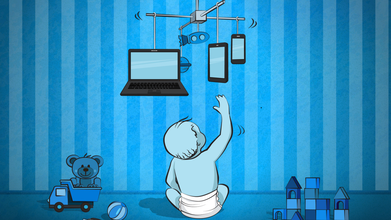- Health Conditions A-Z
- Health & Wellness
- Nutrition
- Fitness
- Health News
- Ayurveda
- Videos
- Medicine A-Z
- Parenting
Stress In Teens? Ayurvedic Practices To Follow For Mental Clarity

Image Credit: Canva
In the modern world, overstimulation is a constant companion, affecting people across all age groups. Adolescents, navigating the complex transition from childhood to adulthood, are particularly vulnerable. This transformative phase is marked by curiosity, rapid growth, and numerous physical, emotional, and social developments. The challenges of adolescence often include managing stress, coping with hormonal changes, and building essential life skills such as problem-solving and self-confidence. Ayurveda, an ancient science of holistic wellness, offers solutions to help adolescents achieve balance and mental clarity during this crucial stage of life.
Adolescence is a time of both opportunity and challenge, where rapid changes can feel overwhelming for teenagers and their families. The physical transformations, emotional swings, and social pressures of this phase demand careful attention to health and well-being. Neglecting these needs can lead to long-term issues, including anxiety, depression, and unhealthy habits. Ayurveda provides a framework to address these concerns by integrating dietary recommendations, lifestyle adjustments, and mental health practices tailored to the unique needs of adolescents.
Emotional turbulence is one of the most common challenges during adolescence. Anxiety, excessive worry, nervousness, and irritability can hinder mental clarity and emotional growth. Depression, marked by persistent sadness, further complicates the journey to adulthood. These emotional challenges are often exacerbated by body image issues, disordered eating habits, and addiction. Many teenagers, especially girls, struggle with their self-image, experimenting with extreme diets or succumbing to eating disorders like anorexia nervosa. Others may turn to substance abuse or display antisocial behaviors, further distancing themselves from a healthy lifestyle.
To combat these challenges, Ayurveda emphasizes balance. Stress management is a cornerstone of Ayurvedic practice, offering tools like yoga, meditation, and breathing exercises. These practices help adolescents find inner calm, reduce stress levels, and foster mental clarity. By incorporating these techniques into daily routines, teenagers can build resilience and enhance their overall well-being.
Hormonal imbalances often accompany adolescence, contributing to mood swings and physical discomfort. Ayurveda recognizes the importance of balancing the doshas—Vata, Pitta, and Kapha—to restore harmony. Personalized diet plans, herbal remedies, and lifestyle adjustments can naturally regulate hormones, promoting emotional stability and vitality. Ancient Ayurvedic formulations like Medhya Rasayana—a group of herbs known for enhancing memory and intellect—are particularly beneficial during this phase. Ingredients like Mandukaparni (Centella asiatica), Guduchi (Tinospora cordifolia), and Brahmi (Bacopa monnieri) improve focus, alleviate stress, and nurture the restless mind.
Ayurvedic therapies such as Pizhichil and Shirodhara further enhance mental clarity and emotional stability during adolescence.
● Pizhichil, also known as the "king of Ayurvedic therapies," involves a gentle, rhythmic pouring of warm medicated oil over the entire body, combined with a synchronized massage. This procedure calms the nervous system, alleviates stress, and nourishes the body. For adolescents, Pizhichil can help soothe physical discomfort from growth spurts and hormonal imbalances while promoting deep relaxation.
● Shirodhara, another widely renowned therapy, involves the continuous pouring of warm herbal oil or buttermilk onto the forehead. This technique specifically targets mental agitation, relieving symptoms of anxiety, insomnia, and excessive worry. Shirodhara’s calming effects on the mind make it an ideal remedy for sensory overstimulation and emotional turbulence in teenagers.
The Ayurvedic approach also extends to everyday practices that support mental health. A nourishing diet is central to this philosophy. Warm, freshly prepared meals infused with herbs and spices like turmeric, cumin, and ginger enhance digestion and promote balance. Adolescents are encouraged to avoid processed and raw foods, stay hydrated, and maintain regular meal times. Proper sleep, another vital aspect, plays a critical role in cognitive function and emotional regulation. Inadequate rest can impair focus, exacerbate anxiety, and weaken immunity.
Ayurveda also underscores the importance of caring for the senses. Adolescents often experience sensory overstimulation, which can disrupt their mental equilibrium. Simple practices like taking breaks during school or work, resting the eyes, and spending time in nature help soothe the senses. Additional Ayurvedic techniques, such as Akshi Tarpana (eye nourishment with medicated oils) for vision, Nasya (nasal drops) for respiratory health, and Abhyanga (oil massage) for tactile stimulation, further support mental clarity.
These holistic practices not only address immediate concerns but also instill lifelong habits that promote overall health and resilience. By embracing Ayurveda, adolescents can navigate the complexities of their transformative years with greater ease and balance, unlocking their full potential in a world filled with distractions and challenges.
In the age of overstimulation, Ayurveda serves as a timeless guide, offering natural solutions for mental clarity and emotional well-being. Its wisdom teaches that harmony within the body and mind is not only achievable but also essential for thriving in an increasingly chaotic world. Through Ayurveda, adolescents can find their inner calm, fostering a foundation of strength and clarity that will carry them into adulthood and beyond.
COVID Vaccination Is Not Linked To Reduce In Childbirth, Says Study

Credits: iStock and Canva
A large population-based study from Linköping University in Sweden has found no evidence that COVID-19 vaccination caused a decline in childbirth during the pandemic, countering persistent rumors that mRNA vaccines affect fertility. The findings have been published in the peer-reviewed journal Communications Medicine.
The study was conducted amid widespread misinformation, particularly on social media, suggesting that COVID-19 vaccines reduce the chances of becoming pregnant. These claims gained traction as several countries, including Sweden, recorded a drop in birth rates during the later stages of the pandemic, prompting questions about a possible link to vaccination.
“Our conclusion is that it’s highly unlikely that the mRNA vaccine against COVID-19 was behind the decrease in childbirth during the pandemic,” said Toomas Timpka, professor of social medicine at Linköping University and one of the study’s authors.
Why Researchers Investigated the Claim
Since the early months of the pandemic, unverified claims about vaccines and fertility have circulated widely online. When official data later showed fewer babies being born in some regions, researchers decided to examine whether vaccination could plausibly explain the trend or whether other social and demographic factors were at play.
Read: Ahmedabad Toddler Swallows Hulk Toy, Showed X-Ray, Doctors Remove It Via Endoscopy
To address the issue, the research team carried out an extensive analysis using real-world healthcare data rather than surveys or self-reported outcomes.
Study Looks at Nearly 60,000 Women
The study analyzed health records of all women aged 18 to 45 years living in Region Jönköping County, a region with a total population of around 369,000 people. This amounted to nearly 60,000 women included in the analysis.
Between 2021 and 2024, about 75 per cent of these women received at least one dose of a COVID-19 vaccine. Researchers examined data on childbirths, registered miscarriages, vaccination status and deaths using official healthcare records, allowing for a comprehensive comparison between vaccinated and unvaccinated groups.
Importantly, the researchers adjusted their analysis for age, recognizing that age is one of the most significant factors influencing fertility and pregnancy outcomes.
No Difference in Births or Miscarriages
When childbirth rates were compared between vaccinated and unvaccinated women, the researchers found no statistically significant difference. The same held true for miscarriage rates among women who became pregnant during the study period.
“We see no difference in childbirth rates between those who have taken the vaccine and those who haven’t,” said Timpka. “We’ve also looked at all registered miscarriages among those who became pregnant, and we see no difference between the groups there either.”
These findings align with several earlier international studies that have similarly found no association between COVID-19 vaccination and reduced fertility.
Other Factors Likely Behind Falling Birth Rates
According to the researchers, the decline in childbirth observed during the pandemic is more plausibly explained by broader demographic and social trends.
People currently in their 30s, the age group most likely to have children, were born in the second half of the 1990s. That period was marked by economic challenges and lower birth rates in Sweden, meaning today’s pool of potential parents is smaller than in previous generations.
In addition, pandemic-related factors such as health concerns, economic uncertainty, delayed family planning and lifestyle changes during lockdowns may have contributed to fewer pregnancies.
One of the study’s key strengths is its large, representative sample drawn from an entire region rather than a selected group. By using verified healthcare records and accounting for age-related effects, the researchers aimed to minimize bias and improve reliability.
The study received financial support from several sources, including the Swedish Research Council.
Ahmedabad Toddler Swallows Hulk Toy, Showed X-Ray, Doctors Remove It Via Endoscopy

Credits: X
Ahmedabad toddler, one-and-a-half-year-old boy swallowed a 'Hulk' toy, which is based on a popular comic superhero. The toy was stuck in his stomach when his parents took him to the Civil Hospital. According to reports by News18, the child is identified as Vansh who showed the signs of discomfort and began vomiting. This is what alarmed the parents.
As per the News18 report, his mother Bhavika was suspicious when she noticed that one of his toys was missing. The child was rushed to the hospital and an X-ray revealed that he had swallowed the entire plastic toy. The toy was not broken.
Hindustan Times reported that Dr Rakesh Joshi, Head of the Department of Pediatric Surgery removed the toy through upper GI endoscopy. "Had it been a little late, the toy could have moved further from the stomach and got stuck in the intestines. In that case, there would have been a risk of intestinal blockage and even rupture," the senior doctor said.
"There is a natural valve between the esophagus and the stomach. The biggest challenge was to take out a whole toy through this valve. When we tried to grab it with the endoscope, the toy kept slipping because of the air in the stomach. Pulling the toy by its hand or foot raised the possibility of it getting stuck in the valve and causing it permanent damage," he said.
The doctor noted that if the toy had further slipped down, it would have increased the risk of intestine rupturing.
Ahmedabad Toddler Swallows Hulk Toy: What Parents Must Keep In Their Mind
Under the Toys (Quality Control) Order, 2020 issued by the Department for Promotion of Industry and Internal Trade under the Ministry of Commerce and Industry, toy safety in India was brought under mandatory BIS certification from September 1, 2020. The move aims to ensure safer toys for children while also supporting the government’s policy of curbing non-essential imports.
Industry sources estimate that more than 85 percent of toys sold in India are imported. Officials say the Toys Quality Control Order is a key step in preventing the entry of cheap and substandard toys into the domestic market, many of which fail to meet basic safety requirements.
Ahmedabad Toddler Swallows Hulk Toy: Standards for Electric and Non-Electric Toys
The quality control order clearly defines safety standards based on the type of toy. Non-electric toys such as dolls, rattles, puzzles, and board games must comply with IS 9873 (Part 1):2019. These toys do not rely on electricity for any of their functions.
Electric toys, which include at least one function powered by electricity, are required to meet the standards outlined under IS 15644:2006. Compliance with these standards is mandatory before such toys can be sold in the Indian market.
Ahmedabad Toddler Swallows Hulk Toy: Risks Linked to Untested Toys
Toys that are not tested by NABL-accredited toy testing laboratories can pose serious health risks to children. Sharp edges and poorly finished parts can cause cuts and injuries. PVC toys may contain phthalates, which are considered harmful chemicals.
Many low-quality toys have also been found to contain lead, a substance known to be particularly damaging to brain development in children. Soft toys with fur or hair can trigger allergies or become choking hazards. In some cases, small body parts can get stuck in gaps or holes, increasing the risk of injury.
Testing by NABL-accredited laboratories ensures that toys are safe, durable, and suitable for specific age groups. Parents are advised to check for IS marks on toys before purchasing, as this indicates compliance with Indian safety standards.
Ahmedabad Toddler Swallows Hulk Toy: What Parents Should Check Before Buying Toys
Experts recommend avoiding toys with small detachable parts for toddlers and young children, as they are more likely to put objects in their mouths. Toys should always match the child’s age, skill level, and interests.
Parents are also urged to look for IS marks, which confirm that the toy has been tested and certified. Loud toys should be avoided, as prolonged exposure to sounds above 85 decibels can harm a child’s hearing.
Electric toys with heating elements should be used with caution or avoided altogether due to burn risks. Finally, toys with sharp edges or shooting components should be carefully examined to prevent cuts and injuries.
Tech And Devices Have 'Horrific' Impact On Kids, Says Study

Credits: iStock
Doctors across the UK are raising the alarm over what they describe as mounting evidence of serious health harms linked to excessive screen time and unrestricted access to digital content among children and young people.
The Academy of Medical Royal Colleges (AoMRC), which represents 23 medical royal colleges and faculties, says frontline clinicians are witnessing deeply concerning patterns across the NHS. According to the academy, doctors working in primary care, hospitals and community settings have shared firsthand accounts of what they describe as “horrific cases” affecting both physical and mental health.
Evidence From the Frontline
The academy has now launched a formal evidence-gathering exercise to better understand the harms clinicians are repeatedly encountering and whether these can be attributed to technology use and digital devices.
Its aim is twofold. First, to shine a light on risks that often go unnoticed, including prolonged screen time and exposure to harmful online content. Second, to develop guidance for healthcare professionals on how to identify, address and manage these issues in clinical practice.
In a statement, the AoMRC said it already has evidence pointing to significant impacts on children’s wellbeing, ranging from physical concerns to mental health challenges linked to both excessive device use and harmful online material. The work is expected to be completed within three months.
A Public Health Emergency?
Dr Jeanette Dickson, chair of the academy, said the scale of the problem is becoming impossible to ignore. Speaking to The Sunday Times, she warned that clinicians may be witnessing the early stages of a public health emergency.
“Everywhere we look, we see children and adults glued to their screens,” she said. “I really worry for children, some of whom are self-evidently imprisoned in a digital bubble.”
Copies of the academy’s letter outlining these concerns have been sent to Health Secretary Wes Streeting and Science and Technology Secretary Liz Kendall, as well as Lucy Chappell, chief executive of the National Institute for Health Research, and the government’s chief medical adviser, Sir Chris Whitty.
Government Action and Global Trends
The warnings come as the UK government prepares to consult on possible restrictions on social media use for under-16s. Options under consideration range from a complete ban to more targeted measures such as time limits and tighter controls on algorithms.
Recent government research has already linked screen time to poorer speech development in children under five. Internationally, the debate is gaining pace. Australia introduced a ban on under-16s holding social media accounts in December, while countries including France, Denmark, Norway and Malaysia are weighing similar steps.
Why Some Groups Oppose a Blanket Ban
Not everyone agrees that an outright ban is the answer. A joint statement signed by 43 child protection charities and online safety groups, including the NSPCC and the Molly Rose Foundation, warns that blanket bans could backfire.
Andy Burrows, chief executive of the Molly Rose Foundation, said parents and policymakers are being offered a false choice. “It’s being framed as either a total ban or the current appalling status quo,” he said. “Those aren’t the only options.”
Chris Sherwood, chief executive of the NSPCC, echoed the concern, pointing out that for many children, the internet provides vital support. “A blanket ban would take those spaces away overnight,” he said, “and risks pushing teenagers into darker, unregulated corners of the internet.”
Both organizations argue that the focus should shift to holding tech companies accountable for harmful design choices, unsafe algorithms and failures to protect young users.
© 2024 Bennett, Coleman & Company Limited

